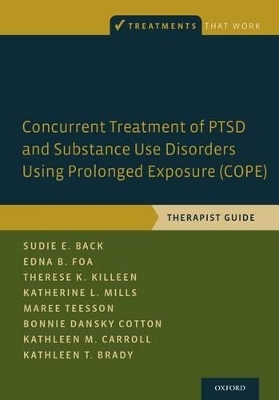
Concurrent Treatment of PTSD and Substance Use Disorders Using Prolonged Exposure (COPE)
Oxford University Press Inc (Verlag)
978-0-19-933453-7 (ISBN)
COPE is an integrated treatment, meaning that both the PTSD and substance use disorder are addressed concurrently in therapy by the same clinician, and patients can experience substantial reductions in both PTSD symptoms and substance use severity. Patients use the COPE Patient Workbook while their clinician uses the Therapist Guide to deliver treatment. The program is comprised of 12 individual, 60 to 90 minute therapy sessions. The program includes several components: information about how PTSD symptoms and substance use interact with one another; information about the most common reactions to trauma; techniques to help the patient manage cravings and thoughts about using alcohol or drugs; coping skills to help the patient prevent relapse to substances; a breathing retraining relaxation exercise; and in vivo (real life) and imaginal exposures to target the patient's PTSD symptoms.
Sudie E. Back, Ph.D., is a Professor in the Department of Psychiatry and Behavioral Sciences at the Medical University of South Carolina, and a Staff Psychologist at the Ralph H. Johnson Veterans Affairs (VA) Medical Center in Charleston, SC. She is Director of the NIDA-sponsored Drug Abuse Research Training (DART) residency and summer research programs at the Medical University of South Carolina. Edna B. Foa, Ph.D., is a Professor of Clinical Psychology in Psychiatry at the University of Pennsylvania, and Director of the Center for the Treatment and Study of Anxiety. Dr. Foa devoted her academic career to study the psychopathology and treatment of anxiety disorders, primarily obsessive-compulsive disorder (OCD) and post-traumatic stress disorder (PTSD). Therese K. Killeen, Ph.D., APRN, is an Associate Professor in the Department of Psychiatry and Behavioral Sciences at the Medical University of South Carolina. Dr. Killeen has over 20 years of experience working with adult and adolescent patients with comorbid PTSD and substance use disorders. Katherine L. Mills, Ph.D., is an Associate Professor at the National Drug and Alcohol Research Centre, University of New South Wales. Dr. Mills is also Director of Treatment Research for the National Health and Medical Research Council (NHMRC) Centre of Research Excellence in Mental Health and Substance Use in Australia. Maree Teesson, Ph.D., is a National Health and Medical Research Council (NHMRC) Senior Research Fellow at the National Drug and Alcohol Research Centre, University of New South Wales, and Director of the NHMRC Centre of Research Excellence in Mental Health and Substance Use in Australia. Bonnie Dansky Cotton, Ph.D., is a senior manager at Microsoft Corporation. She received her PhD in Clinical Psychology from Duke University and completed her internship at the Medical University of South Carolina. Prior to her career at Microsoft, Dr. Cotton was an Assistant Professor in the Department of Psychiatry and Behavioral Sciences at the Medical University of South Carolina. Kathleen M. Carroll, Ph.D., is the Albert E. Kent Professor of Psychiatry at Yale University School of Medicine. She is an internationally renowned researcher on the development of behavioral therapies for substance use disorders. Dr. Carroll is Principal Investigator of the Center for Psychotherapy Development at Yale and Co-Principal Investigator of the New England Consortium of NIDA's Clinical Trials Network. Kathleen T. Brady, MD, Ph.D., is a Distinguished University Professor and Associate Provost for Clinical and Translational Science at the Medical University of South Carolina. Dr. Brady is Director of the Women's Research Center, Director of the MUSC Clinical and Translational Research Center (CTSA), and Director of the Southern Consortium of NIDA's Clinical Trials Network.
Chapter 1: Introductory Information for Therapists ; Chapter 2: Outline of this Treatment Program ; Chapter 3: Session 1: Introduction to COPE ; Chapter 4: Session 2: Common Reactions to Truama and Craving Awareness ; Chapter 5: Session 3: Developing the In Vivo Hierarchy and Craving Management ; Chapter 6: Session 4: Initial Imaginal Exposure ; Chapter 7: Session 5: Imaginal Exposure Continued and Planning and Emergencies ; Chapter 8: Session 6: Imaginal Exposure Continued and Awareness of High-Risk Thoughts ; Chapter 9: Session 7: Imaginal Exposure Continued and Managing High-Risk Thoughts ; Chapter 10: Session 8: Imaginal Exposure Continued and Refusal Skills ; Chapter 11: Session 9: Imaginal Exposure Continued and Seemingly Irrelevant Decisions (SIDs) ; Chapter 12: Session 10: Imaginal Exposure Continued and Anger Awareness ; Chapter 13: Session 11: Final Imaginal Exposure and Anger Management ; Chapter 14: Session 12: Review and Termination ; Appendix A: Information Gathering Form ; Appendix B: Safety Agreement ; Appendix C: Therapist Imaginal Exposure Recording Form ; Appendix D: Certificate of Completion ; References ; About the Authors
| Erscheint lt. Verlag | 8.1.2015 |
|---|---|
| Reihe/Serie | Treatments That Work |
| Verlagsort | New York |
| Sprache | englisch |
| Maße | 175 x 251 mm |
| Gewicht | 408 g |
| Themenwelt | Geisteswissenschaften ► Psychologie ► Klinische Psychologie |
| Medizin / Pharmazie ► Medizinische Fachgebiete ► Psychiatrie / Psychotherapie | |
| Medizin / Pharmazie ► Medizinische Fachgebiete ► Suchtkrankheiten | |
| ISBN-10 | 0-19-933453-6 / 0199334536 |
| ISBN-13 | 978-0-19-933453-7 / 9780199334537 |
| Zustand | Neuware |
| Haben Sie eine Frage zum Produkt? |
aus dem Bereich


